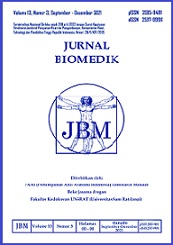TRADITIONAL TREATMENT OF UNCOMPLICATED CASES OF FALCIPARUM MALARIA WITH PIPER BETLE (TRADITIONAL MEDICATION), AS OPPOSED TO TREATMENT WITH CHLOROQUINE
DOI:
https://doi.org/10.35790/jbm.2.1.2010.838Abstract
Abstrak: Di Indonesia, penyakit malaria masih merupakan masalah kesehatan, malahan pada akhir tahun 2004 dan awal tahun 2005 terjadi KLB (Kejadian Luar Biasa) dengan beberapa kematian di beberapa daerah di Indonesia, termasuk Propinsi Sulawesi Utara. Terdapat berbagai kendala dalam penggunaan obat malaria seperti resistensi parasit malaria, obat baru yang mahal, serta belum tersedianya vaksin yang sesuai. Pengobatan dengan ramuan sirih (Piper betle, Linn.), daun mayana (Coleus Arthopurpureus), kuning telur, madu, dan wiski lokal “cap tikus†telah digunakan secara turun temurun olpengobatan tradisional, eh pengobat tradisional asal Propinsi Sulawesi Utara. Dilakukan Active Case Detection (ACD) dan uji efektifitas mengikuti kajian uji klinik. Efektifitas ramuan sirih dibandingkan dengan klorokuin dalam menghilangkan parasit malaria darah tepi. Analisis dilakukan terhadap 70 kasus yang positif parasit malaria falsiparum berusia 10-60 tahun dimana 35 kasus diberi perlakuan dengan ramuan sirih dan 35 kasus lainnya obat klorokuin (dosis standar WHO). Hasil ACD didapatkan prevalensi sebesar 8% (0-23,4%) pada 22 kelurahan. Ramuan ini efektif menghilangkan parasit malaria sebesar 91,4% pada akhir minggu pertama, sedangkan klorokuin 88,6%. Pada akhir minggu ke-4 didapatkan 3 kasus yang diberikan klorokuin masih tetap positif terhadap parasit malaria, sedangkan dengan ramuan sirih semuanya negatif. Analisis dengan tes logrank (Kaplan-Meier) tidak menunjukkan perbedaan bermakna.
Kata kunci: obat tradisional, piper betle, klorokuin, parasit malaria.
Â
Abstract: Malaria is still a health problem in Indonesia. Even at the end of 2004 and the beginning of 2005, outbreaks took place in some areas of Indonesia, including the province of North Sulawesi. There are several obstacles to the use of malaria drugs including resistance of the parasite, unaffordable new drugs, and no available vaccines. Traditional malaria treatment which was a mixture of piper betle (Piper betle, Linn.), mayana leaves (Coleus arthopurpure-us), egg yolk, honey, and local whiskey “cap tikus†has been used for generations by traditional healers in North Sulawesi. The study was designed to ascertain the efficacy of the traditional treatment compared to that of chloroquine to eliminate parasitemia. Seventy cases of uncomplicated falciparum malaria found through active case detection were given either the traditional treatment or chloroquine. The traditional treatment was effective in 91.4% of cases, compared to 88.6% in the cases of chloroquine, in eliminating parasitemia by the end of the first week. By the end of the fourth week, all cases given the traditional treatment were negative of para-sitemia, while three cases given chloroquine were still positive. Analysis using the logrank test (Kaplan-Meier) showed no significant difference between piper betle extract and chloroquine.
Keywords: traditional medicine, piper betle, chloroquine, malaria parasite.
Downloads
Issue
Section
License
Penyunting menerima sumbangan tulisan yang BELUM PERNAH diterbitkan dalam media lain. Naskah yang masuk dievaluasi dan disunting keseragaman format istilah dan cara penulisan sesuai dengan format penulisan yang terlampir dalam jurnal ini.
Segala isi dan permasalahan mengenai tulisan yang yang diterbitkan dalam jurnal menjadi tanggung jawab penuh dari penulis.







